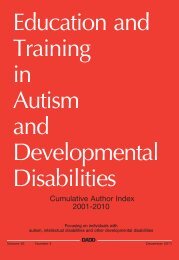Download the Journal (PDF) - Division on Autism and ...
Download the Journal (PDF) - Division on Autism and ...
Download the Journal (PDF) - Division on Autism and ...
Create successful ePaper yourself
Turn your PDF publications into a flip-book with our unique Google optimized e-Paper software.
ility guidelines for MR from state to state.<br />
Variati<strong>on</strong>s include <str<strong>on</strong>g>the</str<strong>on</strong>g> terms used to describe<br />
this excepti<strong>on</strong>ality, <str<strong>on</strong>g>the</str<strong>on</strong>g> criteri<strong>on</strong> used to identify<br />
an intellectual deficit, <strong>and</strong> <str<strong>on</strong>g>the</str<strong>on</strong>g> scores <strong>and</strong><br />
criteria used to identify adaptive behavior deficiencies.<br />
Despite <str<strong>on</strong>g>the</str<strong>on</strong>g> finding that few states<br />
require that adaptive behavior deficits be apparent<br />
in more than <strong>on</strong>e setting, psychologists<br />
<strong>and</strong> o<str<strong>on</strong>g>the</str<strong>on</strong>g>r professi<strong>on</strong>als should c<strong>on</strong>tinue to<br />
follow best practices by ensuring that such<br />
deficits are c<strong>on</strong>sidered from an ecological perspective<br />
through assessment in multiple settings.<br />
Similarly, despite what is known about<br />
inc<strong>on</strong>sistencies in measurement due to r<strong>and</strong>om<br />
influences <strong>on</strong> test performance, fewer<br />
than half of states recommend attenti<strong>on</strong> to<br />
unreliability of IQs though use of SE M <strong>and</strong><br />
associated score ranges. Although some psychologists<br />
<strong>and</strong> o<str<strong>on</strong>g>the</str<strong>on</strong>g>r professi<strong>on</strong>als may place<br />
emphasis <strong>on</strong> part scores that are <str<strong>on</strong>g>the</str<strong>on</strong>g>oretically<br />
based <strong>and</strong> reliable measures from recently<br />
published intelligence tests, less than a quarter<br />
of states recommend c<strong>on</strong>siderati<strong>on</strong> of<br />
<str<strong>on</strong>g>the</str<strong>on</strong>g>m during eligibility. We urge those c<strong>on</strong>ducting<br />
such assessments <strong>and</strong> policy makers to<br />
c<strong>on</strong>sider best practices <strong>and</strong> advancements in<br />
<str<strong>on</strong>g>the</str<strong>on</strong>g>ory <strong>and</strong> measurement of intelligence <strong>and</strong><br />
adaptive behaviors during upcoming revisi<strong>on</strong>s<br />
to <str<strong>on</strong>g>the</str<strong>on</strong>g>ir state guidelines for MR.<br />
References<br />
Alf<strong>on</strong>so, V. C., Flanagan, D. P., & Radwan, S. (2005).<br />
The impact of <str<strong>on</strong>g>the</str<strong>on</strong>g> Cattell–Horn–Carroll <str<strong>on</strong>g>the</str<strong>on</strong>g>ory<br />
<strong>on</strong> test development <strong>and</strong> interpretati<strong>on</strong> of cognitive<br />
<strong>and</strong> academic abilities. In D. P. Flanagan & P.<br />
Harris<strong>on</strong> (Eds.), C<strong>on</strong>temporary intellectual assessment<br />
(2nd ed., pp., 185–202). New York: Guilford<br />
Press.<br />
American Associati<strong>on</strong> <strong>on</strong> Mental Retardati<strong>on</strong>.<br />
(2002). Mental retardati<strong>on</strong>: Definiti<strong>on</strong>, classificati<strong>on</strong>,<br />
<strong>and</strong> systems of supports (10 th ed.). Washingt<strong>on</strong>, DC:<br />
Author.<br />
American Psychiatric Associati<strong>on</strong>. (2000). Diagnostic<br />
<strong>and</strong> statistical manual of mental disorders (4 th ed.,<br />
text revisi<strong>on</strong>). Washingt<strong>on</strong>, DC: Author.<br />
Brody, N. (1997). Intelligence, schooling, <strong>and</strong> society.<br />
American Psychologist, 52, 1046–1050.<br />
Daniel, M. H. (1997). Intelligence testing. American<br />
Psychologist, 52, 1038–1045.<br />
Denning, C. B., Chamberlain, J. A., & Polloway,<br />
E. A. (2000). An evaluati<strong>on</strong> of state guidelines for<br />
mental retardati<strong>on</strong>: Focus <strong>on</strong> definiti<strong>on</strong> <strong>and</strong> clas-<br />
sificati<strong>on</strong> practices. Educati<strong>on</strong> <strong>and</strong> Training in Mental<br />
Retardati<strong>on</strong> <strong>and</strong> Developmental Disabilities, 35,<br />
226–232.<br />
Frakenberger, W. (1984). A survey of state guidelines<br />
for identificati<strong>on</strong> of mental retardati<strong>on</strong>.<br />
Mental Retardati<strong>on</strong>, 22, 17–20.<br />
Frakenberger, W., & Fr<strong>on</strong>zaglio, K. (1991). States’<br />
definiti<strong>on</strong>s <strong>and</strong> procedures for identifying children<br />
with mental retardati<strong>on</strong>: Comparis<strong>on</strong> over<br />
nine years. Mental Retardati<strong>on</strong>, 29, 315–321.<br />
Horn, J. L., & Noll, J. (1997). Human cognitive<br />
capabilities: Gf–Gc <str<strong>on</strong>g>the</str<strong>on</strong>g>ory. In D. P. Flanagan, J. L.<br />
Genshaft, & P. L. Harris<strong>on</strong> (Eds.), C<strong>on</strong>temporary<br />
intellectual assessment: Theories, tests, <strong>and</strong> issues (pp.<br />
53–91). New York: Guilford Press.<br />
Individuals with Disabilities Educati<strong>on</strong> Act, Pub. L.<br />
108–446 (2004).<br />
Jensen, A. R. (1998). The g factor. Westport, CT:<br />
Preager.<br />
Kaufman, A. S., & Lichtenberger, E. O. (2005).<br />
Assessing adolescent <strong>and</strong> adult intelligence (3rd. ed.).<br />
Needham Heights, MA: Allyn & Bac<strong>on</strong>.<br />
Nati<strong>on</strong>al Archives <strong>and</strong> Records Administrati<strong>on</strong>.<br />
(2005). Assistance to states for <str<strong>on</strong>g>the</str<strong>on</strong>g> educati<strong>on</strong> of<br />
children with disabilities, Federal Register, 70<br />
(118). Washingt<strong>on</strong>, DC: Government Printing Office.<br />
Nati<strong>on</strong>al Research Council. (2002). Mental retardati<strong>on</strong>:<br />
Determining eligibility for Social Security benefits.<br />
Washingt<strong>on</strong>, DC: Nati<strong>on</strong>al Academy Press.<br />
Neisser, U., Boodoo, G., Bouchard, T. J., Boykin,<br />
A. W., Brody, N., Ceci, S. J., et al. (1996). Intelligence:<br />
Knowns <strong>and</strong> unknowns. American Psychologist,<br />
51, 77–101.<br />
President’s Committee <strong>on</strong> Mental Retardati<strong>on</strong>.<br />
(1969). The six-hour retarded child. Washingt<strong>on</strong>,<br />
DC: U.S. Government Printing Office.<br />
Sheerenberger, R. C. (1983). A history of mental retardati<strong>on</strong>.<br />
Baltimore, MD: P. H. Brookes.<br />
Utley, C. A., Lowitzer, A. C., & Baumeister, A. A.<br />
(1987). A comparis<strong>on</strong> of <str<strong>on</strong>g>the</str<strong>on</strong>g> AAMD’s definiti<strong>on</strong>,<br />
eligibility criteria, <strong>and</strong> classificati<strong>on</strong> schemes with<br />
state departments of educati<strong>on</strong> guidelines. Educati<strong>on</strong><br />
<strong>and</strong> Training in Mental Retardati<strong>on</strong>, 22, 35–43.<br />
Wechsler, D. (2003). The Wechsler Intelligence Scale for<br />
Children–Fourth Editi<strong>on</strong>. Ant<strong>on</strong>io, TX: Psychological<br />
Corporati<strong>on</strong>.<br />
Wehmeyer, M. L. (2003). Defining mental retardati<strong>on</strong><br />
<strong>and</strong> ensuring access to general curriculum.<br />
Educati<strong>on</strong> <strong>and</strong> Training in Developmental Disabilities,<br />
38, 271–282.<br />
Received: 23 August 2006<br />
Initial Acceptance: 11 October 2006<br />
Final Acceptance: 20 January 2007<br />
Eligibility Guidelines / 131
















